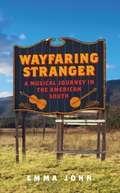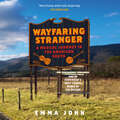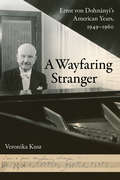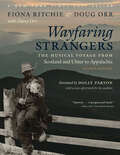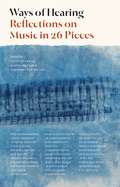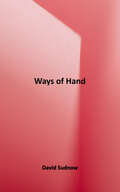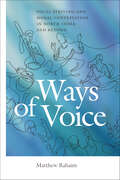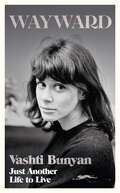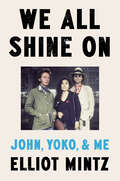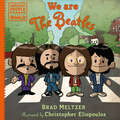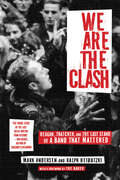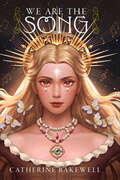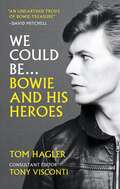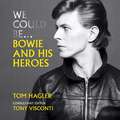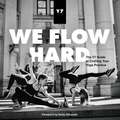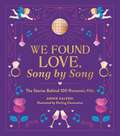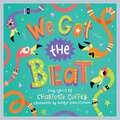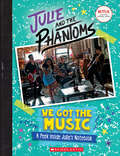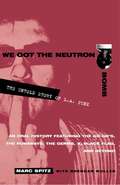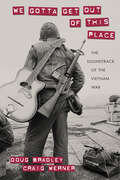- Table View
- List View
Wayfaring Stranger: A Musical Journey in the American South
by Emma JohnCan you feel nostalgic for a life you've never known?Suffused with her much-loved warmth and wit, Emma John's memoir follows her moving and memorable journey to master one of the hardest musical styles on earth - and to find her place in an alien world.Emma had fallen out of love with her violin when a chance trip to the American South introduced her to bluegrass music. Classically trained, highly strung and wedded to London life, Emma was about as country as a gin martini. So why did it feel like a homecoming?Answering that question takes Emma deep into the Appalachian mountains, where she uncovers a hidden culture that confounds every expectation - and learns some emotional truths of her own.
Wayfaring Stranger: A Musical Journey in the American South
by Emma JohnCan you feel nostalgic for a life you've never known?Suffused with her much-loved warmth and wit, Emma John's memoir follows her moving and memorable journey to master one of the hardest musical styles on earth - and to find her place in an alien world.Emma had fallen out of love with her violin when a chance trip to the American South introduced her to bluegrass music. Classically trained, highly strung and wedded to London life, Emma was about as country as a gin martini. So why did it feel like a homecoming?Answering that question takes Emma deep into the Appalachian mountains, where she uncovers a hidden culture that confounds every expectation - and learns some emotional truths of her own.
Wayfaring Stranger: A Musical Journey in the American South
by Emma JohnCan you feel nostalgic for a life you've never known?Suffused with her much-loved warmth and wit, Emma John's memoir follows her moving and memorable journey to master one of the hardest musical styles on earth - and to find her place in an alien world.Emma had fallen out of love with her violin when a chance trip to the American South introduced her to bluegrass music. Classically trained, highly strung and wedded to London life, Emma was about as country as a gin martini. So why did it feel like a homecoming?Answering that question takes Emma deep into the Appalachian mountains, where she uncovers a hidden culture that confounds every expectation - and learns some emotional truths of her own.
A Wayfaring Stranger: Ernst von Dohnányi's American Years, 1949-1960 (California Studies in 20th-Century Music #25)
by Veronika KuszOn March 10, 1948, world-renowned composer and pianist Ernst von Dohnányi (1877−1960) embarked for the United States, leaving Europe for good. Only a few years earlier, the seventy-year-old Hungarian had been a triumphant, internationally admired musician and leading figure in Hungarian musical life. Fleeing a political smear campaign that sought to implicate him in intellectual collaboration with fascism, he reached American shores without a job or a home. A Wayfaring Stranger presents the final period in Dohnányi’s exceptional career and uses a range of previously unavailable material to reexamine commonly held beliefs about the musician and his unique oeuvre. Offering insights into his life as a teacher, pianist, and composer, the book also considers the difficulties of émigré life, the political charges made against him, and the compositional and aesthetic dilemmas faced by a conservative artist. To this rich biographical account, Veronika Kusz adds an in-depth examination of Dohnányi’s late works—in most cases the first analyses to appear in musicological literature. This corrective history provides never-before-seen photographs of the musician’s life in the United States and skillfully illustrates Dohnányi’s impact on European and American music and the culture of the time.
Wayfaring Strangers: The Musical Voyage from Scotland and Ulster to Appalachia
by Fiona Ritchie Doug OrrFrom the seventeenth through the nineteenth centuries, a steady stream of Scots migrated to Ulster and eventually onward across the Atlantic to resettle in the United States. Many of these Scots-Irish immigrants made their way into the mountains of the southern Appalachian region. They brought with them a wealth of traditional ballads and tunes from the British Isles and Ireland, a carrying stream that merged with sounds and songs of English, German, Welsh, African American, French, and Cherokee origin. Their enduring legacy of music flows today from Appalachia back to Ireland and Scotland and around the globe. Ritchie and Orr guide readers on a musical voyage across oceans, linking people and songs through centuries of adaptation and change.Enriched by the insights of key contributors to the living tradition on both sides of the Atlantic, accompanying this abundantly illustrated volume is an online Spotify playlist featuring over 20 songs by musicians profiled in the book, including Dolly Parton, Dougie MacLean, Cara Dillon, John Doyle, Pete Seeger, Sheila Kay Adams, Jean Ritchie, Doc Watson, David Holt, Anais Mitchell, Al Petteway, and more.
Ways of Hearing: Reflections on Music in 26 Pieces
by Scott Burnham, Marna Seltzer & Dorothea von MoltkeAn outstanding anthology in which notable musicians, artists, scientists, thinkers, poets, and more—from Gustavo Dudamel and Carrie Mae Weems to Ruth Bader Ginsburg and Paul Muldoon—explore the influence of music on their lives and workContributors include: Laurie Anderson ● Jamie Barton ● Daphne A. Brooks ● Edgar Choueiri ● Jeff Dolven ● Gustavo Dudamel ● Edward Dusinberre ● Corinna da Fonseca-Wollheim ● Frank Gehry ● James Ginsburg ● Ruth Bader Ginsburg ● Jane Hirshfield ● Pico Iyer ● Alexander Kluge ● Nathaniel Mackey ● Maureen N. McLane ● Alicia Hall Moran ● Jason Moran ● Paul Muldoon ● Elaine Pagels ● Robert Pinsky ● Richard Powers ● Brian Seibert ● Arnold Steinhardt ● Susan Stewart ● Abigail Washburn ● Carrie Mae Weems ● Susan Wheeler ● C. K. Williams ● Wu FeiWhat happens when extraordinary creative spirits—musicians, poets, critics, and scholars, as well as an architect, a visual artist, a filmmaker, a scientist, and a legendary Supreme Court justice—are asked to reflect on their favorite music? The result is Ways of Hearing, a diverse collection that explores the ways music shapes us and our shared culture. These acts of musical witness bear fruit through personal essays, conversations and interviews, improvisatory meditations, poetry, and visual art. They sound the depths of a remarkable range of musical genres, including opera, jazz, bluegrass, and concert music both classical and contemporary.This expansive volume spans styles and subjects, including Pico Iyer’s meditations on Handel, Arnold Steinhardt’s thoughts on Beethoven’s Grosse Fuge, and Laurie Anderson and Edgar Choueiri’s manifesto for spatial music. Richard Powers discusses the one thing about music he’s never told anyone, Daphne Brooks draws sonic connections between Toni Morrison and Cécile McLorin Salvant, and Ruth Bader Ginsburg reveals what she thinks is the sexiest duet in opera. Poems interspersed throughout further expand how we can imagine and respond to music. Ways of Hearing is a book for our times that celebrates the infinite ways music enhances our lives.
Ways of the Hand: The Organization of Improvised Conduct
by David SudnowThis is David Sudnow's classic account of how his hands learned to improvise jazz on the piano. David Sudnow is the author of Passing On and editor of Studies in Social Interaction. Since writing this book, he has developed a piano training method based on its insights.
Ways of Voice: Vocal Striving and Moral Contestation in North India and Beyond (Music / Culture)
by Matthew RahaimWays of Voice explores techniques of voice production in North India, from Bollywood to raga music to ghazal to devotional hymns and Sufi song. The voices in play here are not merely given, but achieved. Singers consciously train themselves to cultivate characteristic vocal gaits, sonorities, and poetic attunements; they adopt postures of the vocal apparatus; they build habits of listening, temporality, and social relations. The action in Ways of Voice revolves around several dozen North Indian popular, devotional, classical, and folk singers engaged in projects of vocal striving. Like most singers, they are strategically working on changing, refining, and making their own voices. The book thus highlights the ways in which singers not only "have" voice, but actively acquire, cultivate and contest particular vocal dispositions for particular kinds of listeners. In framing a "Hindustani vocal ecumene" that encompasses a diverse range of classical, popular, and spiritual-devotional musical styles and practices, it offers an expansive look at ways of voice that extend far beyond commonsense boundaries of genre and place. A rich archive of audio and video examples are provided on the online companion site, which can be found at https://www.weslpress.org/readers-companions/.
Wayward: Just Another Life to Live
by Vashti Bunyan'Magical and transporting . . . Wayward proves that Bunyan has lived the best possible life, on her own idiosyncratic terms'Maggie O'Farrell'A gorgeous account of outsiderness and survival: a map of how to live outside the boundaries and of striving for an authentic artistic life. A quietly defiant and moving work' Sinéad Gleeson'An epic in miniature . . . I loved - and lived - every sentence' Benjamin MyersIn 1968, Vashti Bunyan gave up everything and everybody she knew in London to take to the road with a horse, wagon, dog, guitar and her then partner. They made the long journey up to the Outer Hebrides in an odyssey of discovery and heartbreak, full of the joy of freedom and the trudge of everyday reality, sleeping in the woods, fighting freezing winters and homelessness. Along the way, Vashti wrote the songs that would lead to the recording of her 1970's album Just Another Diamond Day, the lilting lyrics and guitar conveying innocent wonder at the world around her, whilst disguising a deeper turmoil under the surface. From an unconventional childhood in post-war London, to a fledgling career in mid-sixties pop - recording a single written by Mick Jagger and Keith Richards - to the despair and failure to make any headway with her own songs, she rejected the music world altogether and left it all behind. After retreating to a musical wilderness for thirty years, the rediscovery of her recordings in 2000 brought Vashti a second chance to write, record and perform once more. One of the great hippie myths of the 1960s, Wayward, Just Another Life to Live, rewrites the narrative of a barefoot girl on the road to describe a life lived at full tilt from the first, revealing what it means to change course and her emotional struggle, learning to take back control of her own life.
Wayward: Just Another Life to Live
by Vashti Bunyan'Magical and transporting . . . Wayward proves that Bunyan has lived the best possible life, on her own idiosyncratic terms'Maggie O'Farrell'A gorgeous account of outsiderness and survival: a map of how to live outside the boundaries and of striving for an authentic artistic life. A quietly defiant and moving work' Sinéad Gleeson'An epic in miniature . . . I loved - and lived - every sentence' Benjamin MyersIn 1968, Vashti Bunyan gave up everything and everybody she knew in London to take to the road with a horse, wagon, dog, guitar and her then partner. They made the long journey up to the Outer Hebrides in an odyssey of discovery and heartbreak, full of the joy of freedom and the trudge of everyday reality, sleeping in the woods, fighting freezing winters and homelessness. Along the way, Vashti wrote the songs that would lead to the recording of her 1970's album Just Another Diamond Day, the lilting lyrics and guitar conveying innocent wonder at the world around her, whilst disguising a deeper turmoil under the surface. From an unconventional childhood in post-war London, to a fledgling career in mid-sixties pop - recording a single written by Mick Jagger and Keith Richards - to the despair and failure to make any headway with her own songs, she rejected the music world altogether and left it all behind. After retreating to a musical wilderness for thirty years, the rediscovery of her recordings in 2000 brought Vashti a second chance to write, record and perform once more. One of the great hippie myths of the 1960s, Wayward, Just Another Life to Live, rewrites the narrative of a barefoot girl on the road to describe a life lived at full tilt from the first, revealing what it means to change course and her emotional struggle, learning to take back control of her own life.
We All Shine On: John, Yoko, and Me
by Elliot MintzA personal and revealing look at the last ten years of John Lennon&’s life and his partnership with Yoko Ono, written by the friend who knew them best In 1972, Elliot Mintz installed a red light in his bedroom in Laurel Canyon. When it started flashing, it meant that either John Lennon or Yoko Ono—or sometimes both—were calling him. Which they did almost every day for nearly ten years, engaging Mintz in hours-long late-night phone conversations that all but consumed him for the better part of a decade. In We All Shine On, Mintz—a former radio and television host in Los Angeles—recounts the story of how their unlikely friendship began and where it led him over the years, revealing the ups and downs of a wild, touching, heartbreaking, and sometimes shocking relationship. Mintz takes readers inside John and Yoko&’s inner sanctums, including their expansive seventh-floor apartment in New York&’s fabled Dakota building, where Mintz was something of a semipermanent fixture, ultimately becoming the Lennons' closest and most trusted confidant. Mintz was with John and Yoko through creative highs, relationship and private challenges, fascinating interactions with the other former Beatles, and the happiest moment of their lives together, the birth of their son, Sean. He was also by Yoko&’s side during the aftermath of John&’s assassination on the doorstep of the Dakota—not merely a witness to it all, but a key figure in the drama of John and Yoko&’s extraordinary lives. We All Shine On is a must-read for Beatles and Lennon fans, offering an up close and intimate view of one of the most celebrated artists of the twentieth century, as well as one of the most fascinating marriages. But it&’s also a relationship story that just about everyone can relate to, a tale about partnership, loyalty, and trust, and most of all, the lasting legacy of a true and deep friendship.
We are The Beatles (Ordinary People Change the World)
by Brad MeltzerThe Fab Four, the most beloved band of all time, join the ranks of this New York Times bestselling picture book biography series about heroes, for ages 5 to 9.They began as Johnny and the Moondogs, and they weren't very good. But these teens who loved music more than anything kept working at their craft and playing on any small stage they could find. And eventually they became the most recognizable, most influential rock and roll band of all time. How? Through dedicated teamwork, shared passion, and love. They knew that the best music is the music you make together!This friendly, fun biography series inspired the PBS Kids TV show Xavier Riddle and the Secret Museum. One great role model at a time, these books encourage kids to dream big.Included in each book are:• A timeline of key events in the hero&’s history• Photos that bring the story more fully to life• Comic-book-style illustrations that are irresistibly adorable• Childhood moments that influenced the heroes• Facts that make great conversation-starters• A virtue these heroes embody: This book celebrates the importance of teamwork.You&’ll want to collect each book in this dynamic, informative series!
We Are The Clash: Reagan, Thatcher, and the Last Stand of a Band That Mattered
by Mark Andersen Ralph Heibutzki&“An ambitious look at the last days of the Clash . . . as much a political history of the 1980s as it is a look at an influential band in its final years.&”—Publishers Weekly The Clash was a paradox of revolutionary conviction, musical ambition, and commercial drive. We Are The Clash is a gripping tale of the band&’s struggle to reinvent itself as George Orwell&’s 1984 loomed. This bold campaign crashed headlong into a wall of internal contradictions and rising right-wing power. While the world teetered on the edge of the nuclear abyss, British miners waged a life-or-death strike, and tens of thousands died from US guns in Central America, Clash cofounders Joe Strummer, Paul Simonon, and Bernard Rhodes waged a desperate last stand after ejecting guitarist Mick Jones and drummer Topper Headon. The band shattered just as its controversial final album, Cut the Crap, was emerging. Andersen and Heibutzki weave together extensive archival research and in-depth original interviews with virtually all of the key players involved to tell a moving story of idealism undone by human frailty amid a climatic turning point for our world. &“The Clash&’s final chapter, after guitarist Mick Jones&’ 1983 departure, has largely been forgotten—until this book, in which authors Mark Andersen and Ralph Heibutzki argue that the punk pioneers were still creating vital music to the very end.&”—Rolling Stone, an RS Picks/New Books &“Focuses on a very different moment in the band&’s history: the point at which the group splintered in the early 1980s, and its members grappled with an onset of reactionary governments around the world.&”—Vol. 1 Brooklyn &“One of the most rewarding music books you&’ll come across this year.&”—Johns Hopkins Magazine
We Are the Song
by Catherine BakewellA lush and beautiful fantasy set in a world where music is magic and the fate of many thrones lies with one girl…Twelve-year-old Elissa has been raised in seclusion as a devotee of the Mother Goddess. She is a special child, a blessed child, a child who can sing miracles into being. Her voice can heal wounds, halt landslides, cure hunger—and even end wars. But there are those who would use her gift for darker things. And when Elissa finds herself the farthest from home she&’s ever been—along with her vain and jealous music tutor, Lucio—she will have to develop the judgment to decide who wants to use her song to heal… and who wants to use her song to hurt.
We Could Be: Bowie and his Heroes
by Tom Hagler***With consultant editor Tony Visconti. David Bowie's story has never been told quite like this.Tracing the star's encounters with fellow icons throughout his life, We Could Be offers a new history of Bowie, collecting 300 short stories that together paint a portrait of humour, humility, compassion, tragedy and more besides.He embarrasses himself in front of Lennon and Warhol. He saves the life of Nina Simone. He is hated by Bob Dylan. He teaches Michael Jackson the moonwalk. Individually astonishing, together these stories - including details never before revealed - build a new picture of Bowie, one which shows his vulnerability, his sense of humour, his inner diva.Exhaustively researched from thousands of sources by BBC reporter and Bowie obsessive Tom Hagler - with the guidance and memories of Bowie's long-time producer Tony Visconti - We Could Be is fascinating, comic, compelling, and a history of Bowie unlike any that has come before.
We Could Be: Bowie and his Heroes
by Tom Hagler***With consultant editor Tony Visconti. David Bowie's story has never been told quite like this.Tracing the star's encounters with fellow icons throughout his life, We Could Be offers a new history of Bowie, collecting 300 short stories that together paint a portrait of humour, humility, compassion, tragedy and more besides.He embarrasses himself in front of Lennon and Warhol. He saves the life of Nina Simone. He is hated by Bob Dylan. He teaches Michael Jackson the moonwalk. Individually astonishing, together these stories - including details never before revealed - build a new picture of Bowie, one which shows his vulnerability, his sense of humour, his inner diva.Exhaustively researched from thousands of sources by BBC reporter and Bowie obsessive Tom Hagler - with the guidance and memories of Bowie's long-time producer Tony Visconti - We Could Be is fascinating, comic, compelling, and a history of Bowie unlike any that has come before.
We Could Be: Bowie and his Heroes
by Tom Hagler***With consultant editor Tony Visconti. David Bowie's story has never been told quite like this.Tracing the star's encounters with fellow icons throughout his life, We Could Be offers a new history of Bowie, collecting 300 short stories that together paint a portrait of humour, humility, compassion, tragedy and more besides.He embarrasses himself in front of Lennon and Warhol. He saves the life of Nina Simone. He is hated by Bob Dylan. He teaches Michael Jackson the moonwalk. Individually astonishing, together these stories - including details never before revealed - build a new picture of Bowie, one which shows his vulnerability, his sense of humour, his inner diva.Exhaustively researched from thousands of sources by BBC reporter and Bowie obsessive Tom Hagler - with the guidance and memories of Bowie's long-time producer Tony Visconti - We Could Be is fascinating, comic, compelling, and a history of Bowie unlike any that has come before.(P)Octopus Publishing Group 2021
We Danced All Night: My Life Behind the Scenes with Alan Jay Lerner
by Doris ShapiroMrs. Shapiro's 14 years as an assistant to Alan Jay Lerner, from before "My Fair Lady" to "On a Clear Day You Can See Forever."
We Flow Hard: The Y7 Guide to Crafting Your Yoga Practice
by Emily Didonato Mason Levey Sarah LeveyY7 Studios co-founders Sarah and Mason Levey bring their sweat-dripping, beat-bumping practice to readers with We Flow Hard, a fitness and lifestyle book from the original hip-hop yoga studio.Y7 embodies a modern, streamlined approach to the ancient practice of vinyasa, fusing edgy aspiration with flowing, individualized yoga sequences. We Flow Hard brings the brand's signature graphic aesthetic, playful puns, and beat-bumping energy to a fitness and lifestyle guide for today's tribe of hip, provocative yogis.As practical as it is inspirational, We Flow Hard includes sections on the history and benefits of yoga, the art of crafting the perfect workout playlist, and tips on incorporating yogic practices and meditation into a contemporary lifestyle -- for people who aren't planning on becoming pious vegans. At the book's core is a series of yoga sequences, from targeted "abs and ass" moves to a Y7 spin on traditional vinyasa, and advice on customizing a yoga practice for your own skills and goals. Rigorous yet inviting, this approach to yoga is, in the words of Vogue, "For people who put on gangsta rap and handle it."
We Found Love, Song by Song: The Stories Behind 100 Romantic Hits
by Annie ZaleskiLove songs are for everybody and so is this book. In We Found Love, Song by Song, award-winning author and music journalist Annie Zaleski delivers a beautifully illustrated keepsake that tells the fascinating history and behind-the-scenes stories of the 100 most popular and cherished love songs of all time. Pop the champagne, get the roses ready, and settle down in your favorite armchair. Love is universal to the human experience and love songs bring us joy and remind us of happy moments from our life. We all want it and we all crave it but it's not always easy to find. In this beautifully illustrated volume, We Found Love, Song by Song tells the fascinating history and behind-the-scenes stories of the 100 most popular and cherished love songs of all time and their everlasting impact. From artists such as Fred Astaire and Nat King Cole all the way up to Whitney Houston and Harry Styles, this all-encompassing collection of love songs is sure to ignite the flame and inspire a new favorite playlist. What moving song did Paul McCartney pen as a love letter to his wife and record in one day? What iconic tune about cheating and piña coladas ends with a relationship being saved? What popular ballad was written from the perspective of Juliet and led to hundreds of in-concert proposals? Spanning musical genres and decades of classics and modern hits, featured songs include: Etta James, &“At Last&” Elvis Presley, &“Can&’t Help Falling in Love&” Sonny and Cher, &“I Got You Babe&” Queen, &“Crazy Little Thing Called Love&” Foreigner, &“I Want to Know What Love Is&” Marvin Gaye, &“Sexual Healing&” Tina Turner, &“The Best&” Elton John, &“Can You Feel the Love Tonight&” Shania Twain, &“You&’re Still the One&” Rihanna, &“We Found Love&” John Legend, &“All of Me&” Taylor Swift, "Love Story" And many more! Including full-color illustrations throughout, this gorgeously packaged companion is the perfect gift for you and your loved ones to cherish any time of year.
We Got the Beat: A Children's Picture Book (LyricPop #0)
by Charlotte Caffey Kaitlyn Shea O'ConnorAn exuberant celebration of dance and play in picture book form, based on Charlotte Caffey's joyful classic made famous by the Go-Go's. See the people walking down the street Fall in line just watching all their feet They don't know w
We Got the Beat: A Children's Picture Book (LyricPop)
by Charlotte Caffey Kaitlyn Shea O'ConnorAn exuberant celebration of dance and play in picture book form, based on Charlotte Caffey’s joyful classic made famous by the Go-Go’s. “Who does not love this famous song from the eighties? It’s a great choice of song to put in a picture book. I liked they made the text colorful and fun.” —Portland Book Review "See the people walking down the street Fall in line just watching all their feet They don’t know where they want to go But they’re walking in time They got the beat . . ." We Got the Beat is a children’s picture book based on the hit song by the 1980s new wave group the Go-Go’s. Consisting of five members, the all-female band rocked the nation with their charisma and musical genius. Their hit song “We Got the Beat” spent three weeks at #2 on the Billboard 100 and became their signature song. Says the New York Times: the Go-Go’s “taught a new generation the power of the girl gang.”
We Got the Music: A Peek Inside Julie's Notebook (Julie and the Phantoms)
by G. M. KingCheck out Julie and Luke's lyrics, Flynn's gig schedule for the band, and original Sunset Curve memorabilia in this in-world guide to the hit Netflix show Julie and the Phantoms!Julie Molina is always writing in her notebook -- from lyric ideas to memories of her mom, and even plans for her band, Julie and the Phantoms (including words of wisdom like "Make sure no one realizes the guys are ghosts, not holograms").This fun, in-world guide includes notes between Julie and her best friend, Flynn; messy scribbles from Luke, Reggie, and Alex with ideas for new songs (hey, it's hard to hold a pencil when you're dead!); and suspicious theories from Julie's little brother, Carlos, about exactly what's going on out in the garage... Plus, there are full-color photos on every page!Explore all this and more in this exclusive peek at Julie and the Phantoms, the hit new show from High School Musical and Descendants director Kenny Ortega!
We Got the Neutron Bomb: The Untold Story of L.A. Punk
by Marc Spitz Brendan MullenTaking us back to late '70s and early '80s Hollywood--pre-crack, pre-AIDS, pre-Reagan--We Got the Neutron Bomb re-creates word for word the rage, intensity, and anarchic glory of the Los Angeles punk scene, straight from the mouths of the scenesters, zinesters, groupies, filmmakers, and musicians who were there. "California was wide-open sex--no condoms, no birth control, no morality, no guilt." --Kim Fowley. "The Runaways were rebels, all of us were. And a lot of people looked up to us. It helped a lot of kids who had very mediocre, uneventful, unhappy lives. It gave them something to hold on to." --Cherie Currie. "The objective was to create something for our own personal satisfaction, because everything in our youthful and limited opinion sucked, and we knew better." --John Doe. "The Masque was like Heaven and Hell all rolled into one. It was a bomb shelter, a basement. It was so amazing, such a dive ... but it was our dive." --Hellin Killer. "At least fifty punks were living at the Canterbury. You'd walk into the courtyard and there'd be a dozen different punk songs all playing at the same time. It was an incredible environment." --Belinda Carlisle. Assembled from exhaustive interviews, We Got the Neutron Bomb tells the authentically gritty stories of bands like the Runaways, the Germs, X, the Screamers, Black Flag, and the Circle Jerks--their rise, their fall, and their undeniable influence on the rock 'n' roll of today.
We Gotta Get Out of This Place: The Soundtrack of the Vietnam War (Culture and Politics in the Cold War and Beyond)
by Doug Bradley Craig Werner&“The diversity of voices and songs reminds us that the home front and the battlefront are always connected and that music and war are deeply intertwined.&” —Heather Marie Stur, author of 21 Days to Baghdad For a Kentucky rifleman who spent his tour trudging through Vietnam&’s Central Highlands, it was Nancy Sinatra&’s &“These Boots Are Made for Walkin&’.&” For a black marine distraught over the assassination of Martin Luther King Jr., it was Aretha Franklin&’s &“Chain of Fools.&” And for countless other Vietnam vets, it was &“I Feel Like I&’m Fixin&’ to Die&” or the song that gives this book its title. In We Gotta Get Out of This Place, Doug Bradley and Craig Werner place popular music at the heart of the American experience in Vietnam. They explore how and why U.S. troops turned to music as a way of connecting to each other and the World back home and of coping with the complexities of the war they had been sent to fight. They also demonstrate that music was important for every group of Vietnam veterans—black and white, Latino and Native American, men and women, officers and &“grunts&”—whose personal reflections drive the book&’s narrative. Many of the voices are those of ordinary soldiers, airmen, seamen, and marines. But there are also &“solo&” pieces by veterans whose writings have shaped our understanding of the war—Karl Marlantes, Alfredo Vea, Yusef Komunyakaa, Bill Ehrhart, Arthur Flowers—as well as songwriters and performers whose music influenced soldiers&’ lives, including Eric Burdon, James Brown, Bruce Springsteen, Country Joe McDonald, and John Fogerty. Together their testimony taps into memories—individual and cultural—that capture a central if often overlooked component of the American war in Vietnam.
